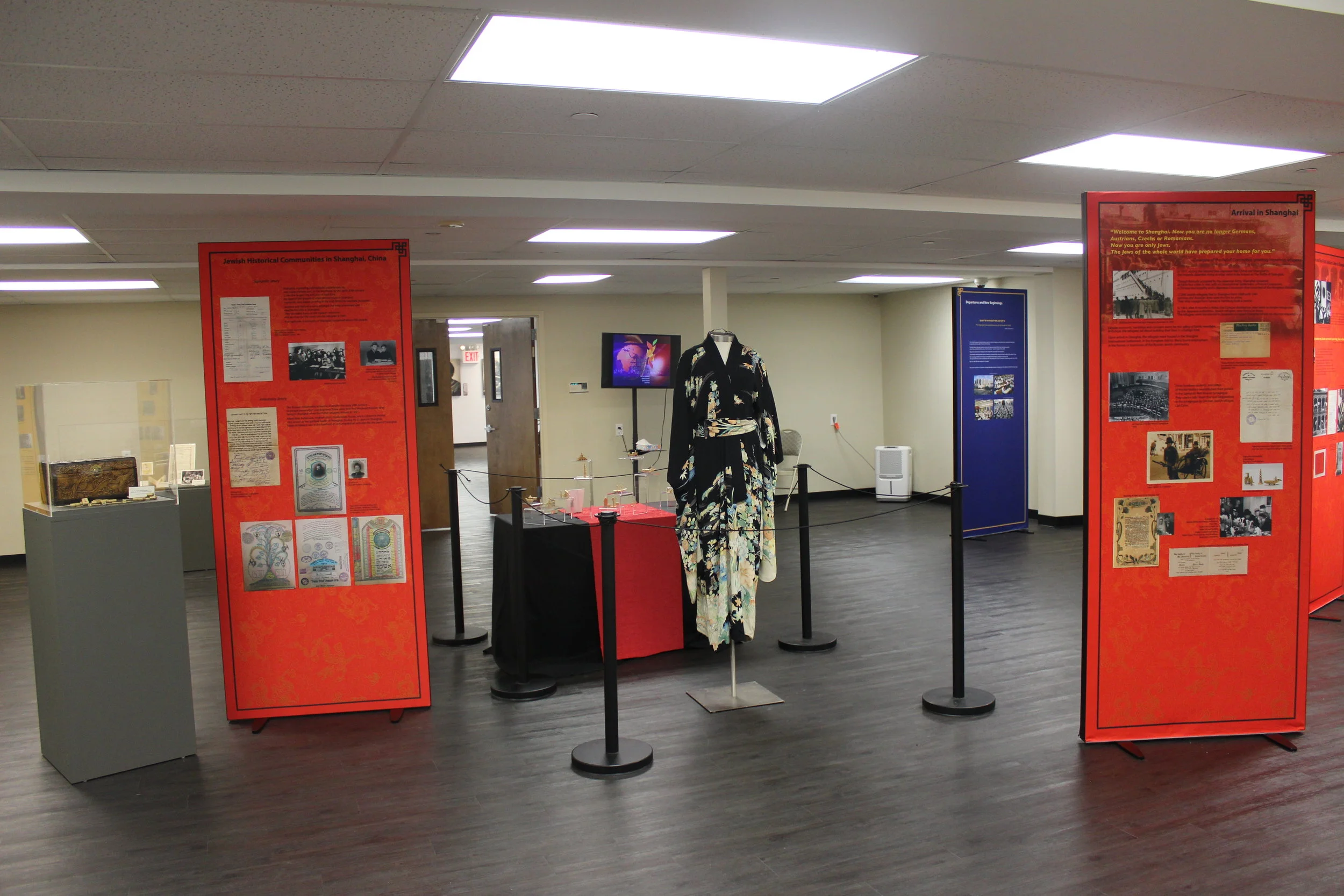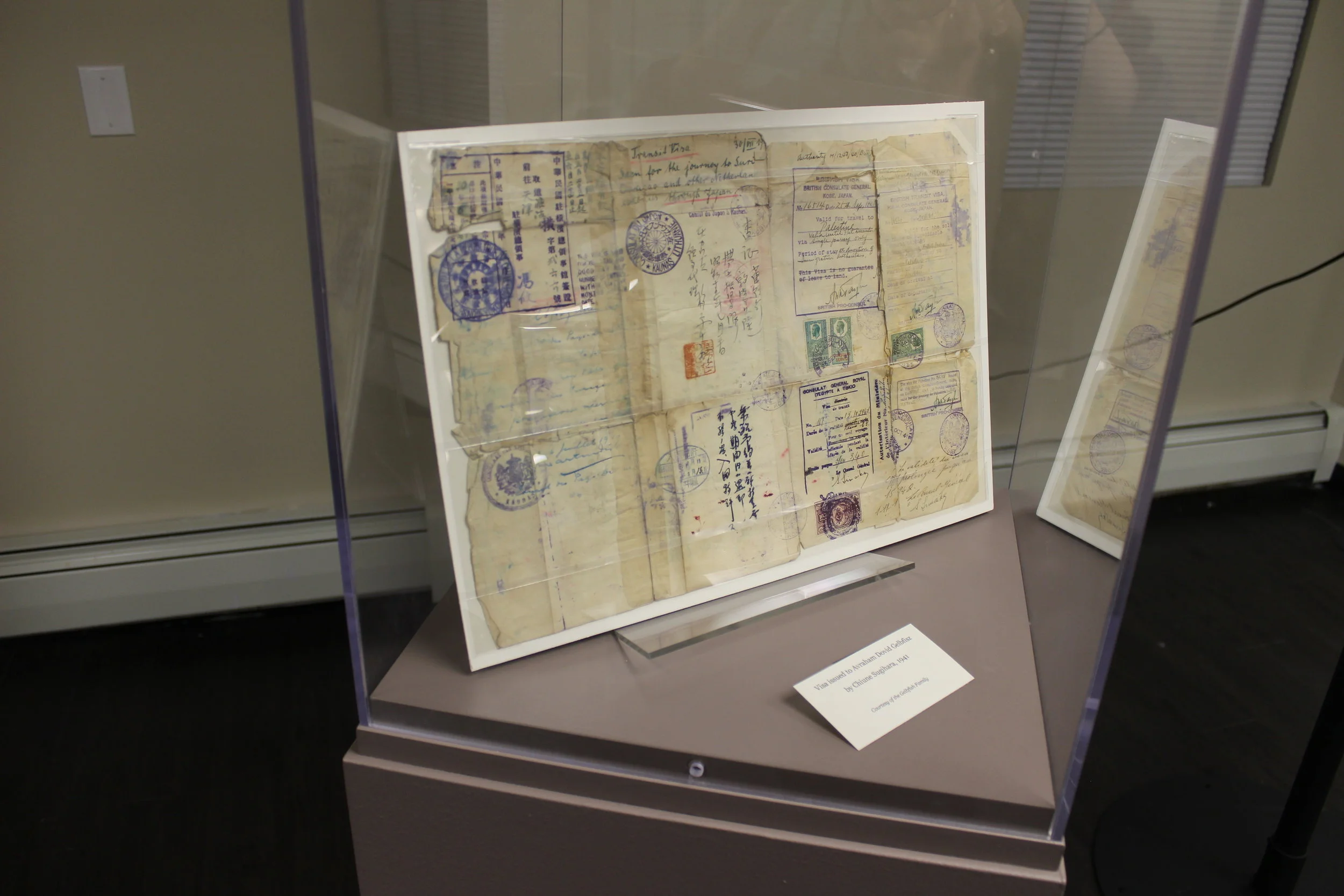AMUD AISH MEMORIAL MUSEUM: SPRING 2018 NEWSLETTER
These last several months have been some of our busiest. We were in Washington, D.C. to support the recognition of a Holocaust hero; our new exhibition, Precious Gift: The Miracle of Shanghai opened to a flurry of national publicity, private tours, and school group visits; we hosted an event during Chol Hamoed Pesach; and we held a book signing for a Holocaust survivor who recently co-authored a book about her life. Please email us to schedule a guided tour of our exhibit. All visits are by appointment only, Monday through Thursday 10:00 a.m. to 3:30 p.m. And, if a visit is not in your immediate future, you can follow us - and read related news and information - on Facebook and Instagram.
A conversation with Director of research & archives, rabbi dovid reidel:
The museum’s Orthodox rescue - or Hatzalah - collection is one of the largest in the world, and Amud Aish is fortunate to have on staff a man who has been steeped in the topic since he was a boy. Rabbi Dovid Reidel’s grandfather, Elimelech “Mike” Tress, president of Agudath Israel of America, was an undaunted leader in U.S.-based efforts to save European Jewry before, during, and after the Holocaust. Rabbi Reidel recently sat down with WFUV’s George Bodarky, host of Cityscape, to talk about his grandfather and other Hatzalah heroes of the Holocaust who are prominently featured in the museum’s collection. .
[Click here to listen to the entire interview with Rabbi Reidel.]
Effort to Award Rabbi Weissmandl the Congressional Gold Medal
Representative Nydia Velázquez (D-NY) and Representative Brian Mast (R-FL) sponsored a bipartisan bill in Congress to posthumously award a Congressional Gold Medal to Rabbi Michoel Ber Weissmandl in recognition of his acts of valor during World War II. The Representatives hosted a congressional reception to better acquaint their Congressional colleagues with Rabbi Weissmandl’s activities, which saved thousands of Eastern European Jews during the Holocaust. Held on October 24, 2017 on Capitol Hill, the reception featured artifacts and source material from Amud Aish’s collection, including an original copy of the “Auschwitz Protocols”, eyewitness accounts documenting the atrocities of the Nazi regime’s “final solution” which Rabbi Weissmandl was instrumental in gathering, translating, and publishing. Rabbi Weissmandl was also one of the architects of the Kindertransport. The Kindertransport brought thousands of Eastern European children under imminent threat out of Nazi-controlled territories to safety in England. Approximately 75 percent of those children were Jewish.
“Rabbi Weissmandl is one who stands out among those in the Orthodox Jewish community who played a pivotal role in saving lives during World War II. Yet, his work has not been recognized. It’s partly because, for all those he saved, he never forgave himself for the ones he could not,” said Rabbi Sholom Friedmann, Director and CEO, Amud Aish Memorial Museum.
Recognizing Rabbi Weissmandl with the Congressional Gold Medal has been supported by Amud Aish and many Jewish educational and cultural groups, including: the Yeshiva of Nitra (founded by Rabbi Weissmandl after his immigration to the United States); the Jewish Federations of North America; the Jewish Community Relations Council; the Simon Weisenthal Center; and the National Council of Young Israel. While the nomination was not successful in 2017, the process was very effective in introducing this chapter of history to members of Congress. Amud Aish will continue to support this effort.
Artifacts from Amud Aish’s collection, including an original copy of the “Auschwitz Protocols”
Congresswoman Nydia Velázquez encourages her colleagues to support her co-sponsored bill to posthumously award a Congressional Gold Media to Rabbi Weissmandl
Current Exhibit - Precious Gift: The Miracle of Shanghai
For the 2017-2018 season, we launched Precious Gift: The Miracle of Shanghai, an exhibition and educational program for schools and private groups that explores the plights of Jews who sought refuge in foreign lands and the heroic efforts of those—from diplomats to everyday people—who risked their lives to help them.
In the exhibit, visitors are introduced to diplomats from Japan, the Netherlands, and Lithuania who defied orders by distributing visas that became lifelines for thousands. They also learn about the journey from Europe to Shanghai, daily life, and the flourishing of Jewish religious life in Kobe, Japan and Shanghai. Throughout the tour, guides note the significance of the various artifacts—such as the sacred Hebrew texts printed in Shanghai and a meal ration card with unused days—to illustrate the personal stories of those who lived through these difficult times.
“The story of the Jews’ escape to Shanghai is one that students don’t typically encounter in school, and yet it carries with it important lessons: the power of faith, the importance of perseverance, the role of resilience, and the imperative of survival,” said Rabbi Sholom Friedmann, Director of Amud Aish Memorial Museum. “Shanghai could not have been more foreign for these European Jews, yet the city largely welcomed them and allowed for their customs; so the Jews were able to practice their faith and establish their institutions without issue. The only yeshiva to survive intact from Europe, the Mir Yeshiva, did so by taking refuge in Shanghai. It operates today, relocated to Jerusalem, and is the largest Yeshiva in the world.”
Background
In 1938, the Jews of Europe were running out of options. The failure at the Evian conference to address the Jewish refugee crisis only emboldened Hitler, and Kristallnacht followed soon after. Shanghai was the only place with unrestricted immigration and no entry visa requirement. It was the last hope for German and Austrian Jews to escape, and thousands did until 1941 when Jewish emigration was forbidden. Shanghai then became a sanctuary for Orthodox Polish Jews who had fled to Lithuania only to find themselves in the path of the Soviets and the Nazis. Chiune Sugihara, Japanese Vice Consul in Kovno, Lithuania, became their ally, disobeying orders by issuing transit visas to the Far East to every Jew who applied. Upon arrival in Shanghai, the refugee population energized the tiny existing Jewish community, establishing Jewish schools for boys and girls and ensuring access to kosher food.
Jewish artifacts from Japanese-occupied Shanghai, 1941
Visa issued to Avraham Dovid Gelbfisz by Chiune Sugihara, 1941
amud aish: recent press
To schedule a school visit or to donate artifacts,
contact Amud Aish at: 718-759-6200 or info@amudaish.org














